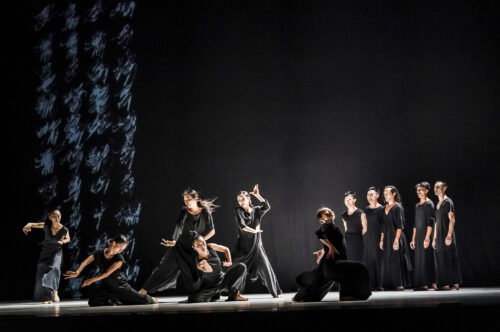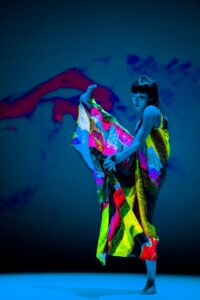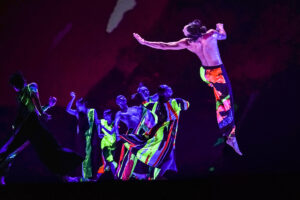Cloud Gate Dance Theatre of Taiwan Starts New US Tour in Houston

Photo by LIU Chen hsiang
When Cloud Gate Dance Theatre of Taiwan takes the stage at the Wortham Center’s Cullen Theater, it will be their first performance in the USA since the pandemic began. The artistic director of the company, CHENG Tsung-lung, choreographed the work they’re presenting, 13 Tongues, a piece that incorporates the culture of a busy district in a Taipei town.
To learn more about 13 Tongues, we talked with Associate Artistic Director of the company, LEE Ching-chun. Lee studied dance at Trinity Laban Conservatoire of Music and Dance in London, and, in 1983, joined Cloud Gate. Lee has danced leading roles in many of the company’s works, most of which were choreographed by the company’s founder, LIN Hwai-min, including the visually striking Songs of the Wanderers.
Neil Ellis Orts: How does it feel to start a new international tour?
LEE Ching-chun: We’re looking forward to it. Cloud Gate used to tour regularly both nationally and internationally, but the pandemic, it has changed everything. Over the last two and a half years we stopped completely international tours. Luckily, at home here, we carry on with domestic performances and working on new pieces. I think this was a very important time for us. We had a chance to reevaluate what we do and how we do things. I feel this difficulty has helped the whole company to grow stronger. We’re very happy to be able to tour again. Through this pandemic difficulty, looking at ourselves, the dance and the body and the relationship between people has changed. [We have] become more solid, more honest.
NEO: What is it like dancing with Cloud Gate?

Photo by LIU Chen hsiang
LCC: It has been the most incredible journey. I joined the company in the 80s, when the company was 10 years old. There has never been a boring moment since then. In Asia, the challenge is always how we can carry the precious cultural elements from this area into a new era to communicate with the world. It’s challenging. It’s exploration. There’s nothing we can take for granted. There are so many things we can use, but then how to translate, how to interpret, how to manifest, and become a language that can be appreciated by the world. I feel like every day is full of challenges. This is why the company dancers are trained in a wide range of disciplines including western and eastern, for example, the Chinese internal martial art, qigong, as well as contemporary dance and ballet. This is all in the way of a laboratory, an experimental process to bring up a new language and a new expression. Challenging but very fulfilling.
NEO: What does it mean to the dancers to dance in 13 Tongues?
LCC: 13 Tongues is the work by our new artistic director, Mr. CHENG Tsung-lung. Mr. CHENG Tsung-lung grew up in a very interesting area in Taipei. 13 Tongues is inspired by a legendary character in the local temple street culture. His name is 13 Tongues. According to the choreographer’s mother, 13 Tongues is a multi-faceted character who can play many, many roles, male or female, young or old. These roles, we can relate to our lives. I think what is wonderful about 13 Tongues is it represents a collective memory of Taiwan. But what is incredible about Tsung-lung is he has such skill that he can capture this and share his imagination. I think it is a piece that can be appreciated by the world, not just Taiwan. I’m looking forward to how the American audience will respond to this work. We had a very good review right before the pandemic when we were touring this piece in France.
NEO: Have you been to this city?
LCC: Yes. It is in Taipei, it is called Wanhua or Bangka. Taiwan is an island and Wanhua is a harbor city. Wanhua is one of the oldest cities established in Taiwan. The immigration history and all the kinds of people trying to make a living creates a very colorful culture.
NEO: Since you’ve been there, do you find 13 Tongues to represent the city as you’ve seen it or did CHENG Tsung-lung surprise you with anything in his vision?

Photo by LIU Chen hsiang
LCC: When I watched the piece, surprisingly, it makes me feel like I understand my ancestors, my grandmother’s, my mother’s, my father’s times. The sounds, the movements, the characters it portrays, the kind of body attitude and posture and the colors—Tsung-lung is only forty-something years old, but how his childhood memories translate, can be put into a dance to such a vivid degree—there was a moment when I watched it, it made me go back to my childhood. Each dancer has a role to play, so it’s very challenging to the company members. Everyone has to be a soloist, has to be in a character. They sing as well as dance. I feel like the dancers grew up through this piece, they grew more mature as performers, not just as a dancer.
NEO: I’ve watched video clips and in some of them, I thought they might be in agony, but then I thought about how mystics of many traditions talk about religious ecstasy and wondered if that was what they were experiencing or portraying.
LCC: Yes, it’s very visceral. There are a lot of religious elements in there, local religious elements. There is a part with chanting. They really did have to go study with the temple master to chant. It’s quite a ritual, but also a lot of skill to make the ritual lively. Part of it is heavy, and there’s a part that is joyous.
NEO: It seems the dancers have to train not only in their body but also in their spirit?
LCC: Yes. It’s the challenge of Cloud Gate, how to use the cultural source to connect with the world, and religion plays an important role in this culture. So the training is to provide basic ability to connect with the techniques, not any one technique. This wide range of disciplines we give to the dancers is to try to make them wider and deeper, looking at their body and their heart. The training shouldn’t become a control or a limit. We break the limits. I would say it is a contemporary dance way of working. They have to connect very closely to the choreographer and the idea [behind the choreography], but it is the dancer who connects his own presence. That’s the freedom. That’s also the challenge.
13 Tongues is presented by Performing Arts Houston in partnership with Asia Society Texas on October 1 at the Wortham Center’s Cullen Theater. Tickets are available at performingartshouston.org.



Recent Comments